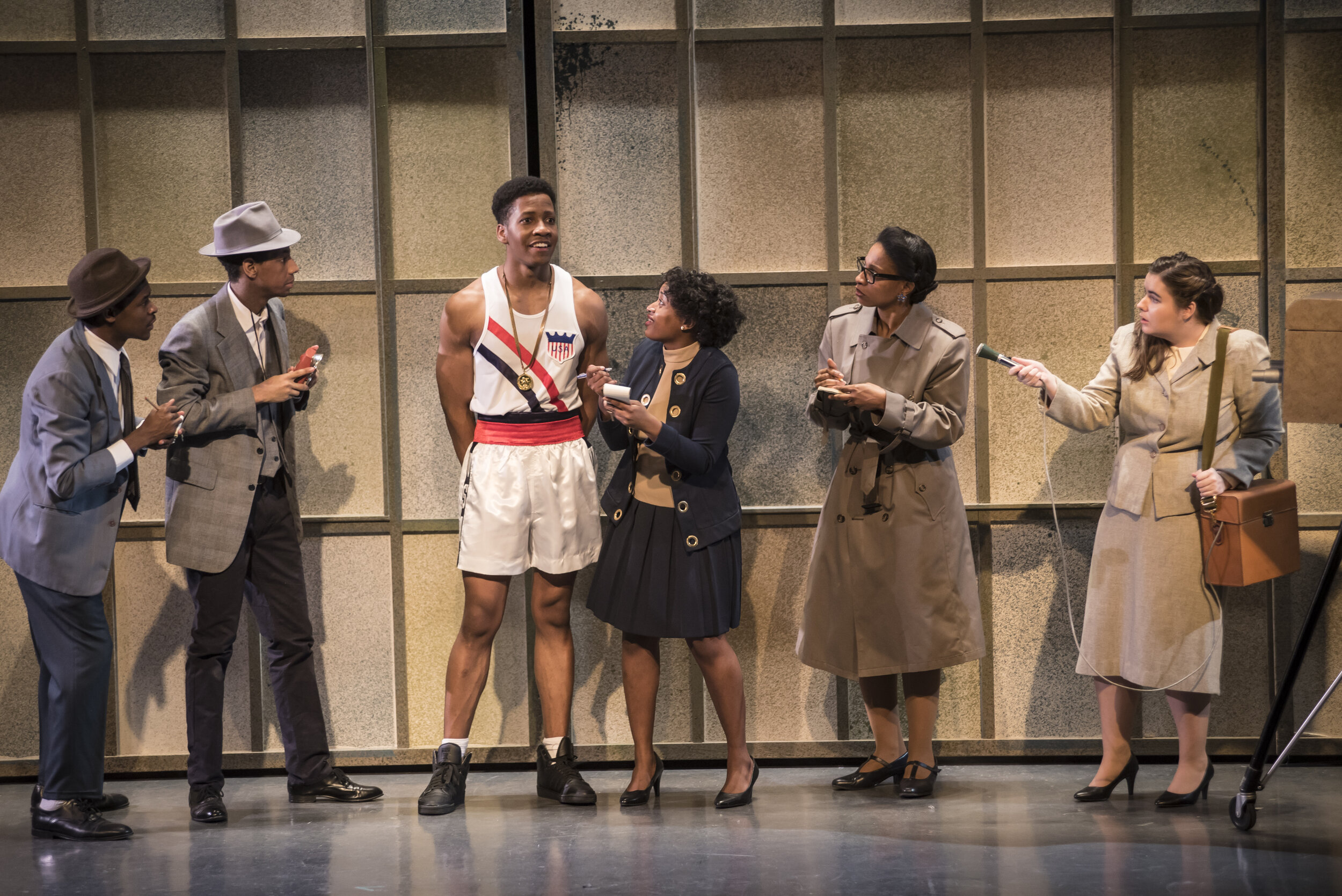
Education Resources
And In This Corner: Cassius Clay
By Idris Goodwin
Before & After
The Show
Historical Timeline
1942 // Muhammad Ali was born as Cassius Clay on January 17th in Louisville, KY to Odessa and Cassius Marcellus Clay.
1944 // Clay’s brother Rudy is born. Rudy followed in his brother’s footsteps to become boxer, Rahman Ali.
1954 // After his bike is stolen, Clay begins training with police officer and boxing coach, Joe Martin. Six weeks later he wins his first fight against Ronnie O’Keefe. Brown vs. Board of Education ends legal segregation in public schools.
1955 // 14-year-old Emmett Till is murdered after allegedly flirting with a white woman. Rosa Parks is arrested for refusing to give up her seat to a white man sparking the yearlong Montgomery Bus Boycott.
1956 // Clay wins the novice Golden Gloves Championship in Louisville.
1959 // Clay wins both the title in the Golden Gloves Tournament of Champions in Chicago and the national Amateur Athletic Union light-heavyweight title.
1960 // Clay graduates from High School, overcomes his fear of flying and wins a gold medal in the Rome Olympics against Polish fighter, Zbigniew Pietrzykowski.
1963 // Clay appears on the Cover of Sports Illustrated for the first time. During his career he graced the cover a total of 35 times. Martin Luther King, Jr. delivers his “I Have a Dream” speech at the March on Washington.
1964 // Cassius Clay defeats Sonny Liston winning the world heavyweight championship at age 22. He changes his name to Muhammad Ali after converting to Islam. The Civil Rights Act is passed outlawing discrimination based on race, color, religion, sex, or national origin.
1965 // The Voting Rights Act prohibits racial discrimination in voting.
1966 // Ali is drafted to serve in Vietnam, but refuses to fight on religious grounds.
1967 // Ali is stripped of all titles, banned from boxing for three years and convicted of refusing induction into the Army. He is sentenced to five years in prison, but freed on bail after several appeals. Loving vs. Virginia invalidates laws prohibiting interracial marriages.
1968 // Ali is ridiculed by the media, but Martin Luther King, Jr. comes to his defense, “He is giving up millions of dollars to do what his conscience tells him is right." King was assassinated later that year.
1969 // Marvel Comics introduces Falcon, the first mainstream African-American superhero.
1971 // The Supreme Court rules in favor of Ali overturning his previous conviction. Able to fight again, Ali challenged Joe Frazier after being publicly taunted with racial slurs. Billed as the “Fight of the Century,” Ali suffers his first defeat. Years later he would challenge Frazier again and win… twice.
1977 // Ali’s youngest daughter Laila is born. In 2007 she retired from professional boxing undefeated.
1978 // Ali became a real superhero starring in the comic book Superman vs. Muhammad Ali.
1981 // Muhammad Ali retires from boxing with an overall record of 56 victories, 5 losses and 37 knockouts.
1990 // Ali secures the release of fourteen American hostages held in Iraq during the Gulf War.
1996 // Ali lights the Olympic flame in Atlanta, GA.
1998 // Ali is named a United Nations Messenger of Peace.
2005 // Ali is awarded the Presidential Medal of Freedom, the nation's highest civilian honor, for being "an inspirational figure to millions of people around the world."
2008 // Barack Hussein Obama is elected as the first African-American President of the United States.
2014 // 18-year-old Michael Brown is shot and killed by a White police officer in Ferguson, MO, sparking protests, riots, and national debate about racial inequality in the United States.
2016 // Muhammed Ali dies of unspecified natural causes at the age of 74.
2016 // 49ers quarterback Colin Kaepernick protests police brutality and racial inequality in the United States by kneeling during the national anthem before each game. His position caused a wide range of support and push back. After the 2016 season, Kapernick became a free agent, and has not been signed to an NFL team since. He has continued his advocacy work. 4 players on the WNBA Minnesota Lynx team wear Black Shirts that say “Change Starts With Us: Justice & Accountability” to a news conference.
2020 // In February, Ahmaud Arbery went for a jog in Glynn County Georgia and was killed by three White men, who chased him in a pick up truck and fatally shot him. The responsible parties were not arrested until May. In the middle of the night on March 13th, Breonna Taylor was killed by police officers executing a warrant to search her apartment in relation to a drug trafficking case. No drugs were found in her apartment. On May 25th in Minneapolis, MN, George Floyd was killed by a police officer during an arrest for an alleged crime. Ahmaud Arbery, Breonna Taylor, and George Floyd’s deaths sparked a summer of national protests, riots, and debates about racial equity, injustice, and systemic issues of racism in America. The summer of 2020 is referred to as a moment of racial reckoning, prompting new waves of online activism, new calls for anti-racism training in businesses and schools, and legislation, like Breonna’s Law.
This timeline reflects only some of the people whose lives have been taken, or who have been victims of physical and/or emotional trauma through racial injustice.
About Muhammad Ali
“If my mind can conceive it, and my heart can believe it — then I can achieve it.” — Muhammad Ali
Guided by Muhammad Ali’s six core principles, The Muhammad Ali Center features an interactive museum, educational programming, and special events to inspire young adults and adults to pursue greatness in their own lives, communities, and countries.
In 1981, Muhammad Ali happened to be in the area where a Vietnam veteran was threatening to jump from the ninth floor of a building. After attempts by the police, a psychologist, and a minister to talk the man down failed, Ali ran to the scene and successfully talked him out of committing suicide.
Watch the famous fight between Cassius Clay and Sonny Liston.
Civil Rights Movement
Cassius Clay grew up under what were known as “Jim Crow Laws.” These were federal, state and local laws in the United States (1876-1965) that mandated racial segregation in all public facilities. Segregation is the act of isolating a race or class from the rest of the population. Supposedly, these laws created a “separate but equal” experience for African Americans. But in reality, these laws led to facilities that were inferior to those provided for the sole use of Caucasian Americans. Some examples of these laws in Kentucky were:
It was unlawful for children of different races to attend the same school.
Intermarriage between white persons and persons of color was prohibited.
All public parks, recreation centers, playgrounds, and more were segregated.
The National Civil Rights Museum in Memphis, TN has some great interactive resources and activities. The Library of Congress also has some fantastic resources and lesson plans for teachers. Facing History and Ourselves is dedicated to helping students learn about racism, antisemitism, and prejudice.
More Resources
“Hating people because of their color is wrong. And it doesn't matter which color does the hating. It's just plain wrong.” – Muhammad Ali
Find out how the Civil Rights Movement continues today through the following organizations.
We Live Here explores the issues of race, class, and history in St. Louis. Working to bridge the gap of understanding between Whites and Blacks, St. Louis Public Radio seeks out a multitude of ways to tell the stories of those who might not naturally be a part of the discussion.
Black Lives Matter is a national organization created in 2012 after George Zimmerman was acquitted for the death of 17 year old Trayvon Martin. After the death of 18 year old Mike Brown, it has grown into a movement to address racism permeating our society.
National Association for the Advancement of Colored People. The mission of the NAACP is to ensure the political, educational, social, and economic equality of rights of all persons and to eliminate race-based discrimination.
Missouri Department of Health and Senior Services: Office of Minority Health. Health and health care disparities continue to cloud the horizon for minority communities resulting in the increased risk of illness, injury, and death. The Office of Minority Health is attempting to eliminate those disparities through assertive leadership, advocacy support, and visible interaction with minority communities in Missouri.
Forward through Ferguson was created after the death of Michael Brown. “FTF centers impacted communities and mobilizes accountable bodies to advance racially equitable systems and policies that ensure all people in the St. Louis region can thrive.”
We Stories Mission: We Stories engages White families to change the conversation about and build momentum towards racial equity in St. Louis.

